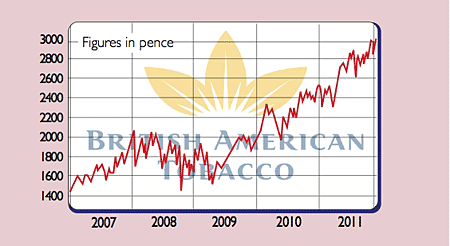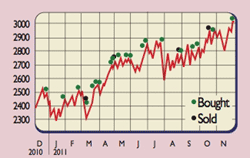Shares in focus: Is tobacco good for your wealth?
British American Tobacco has been one of the most generous stocks around in terms of rewarding shareholders. But can it keep it up? Phil Oakley investigates.
Get the latest financial news, insights and expert analysis from our award-winning MoneyWeek team, to help you understand what really matters when it comes to your finances.
You are now subscribed
Your newsletter sign-up was successful
Want to add more newsletters?

Twice daily
MoneyWeek
Get the latest financial news, insights and expert analysis from our award-winning MoneyWeek team, to help you understand what really matters when it comes to your finances.

Four times a week
Look After My Bills
Sign up to our free money-saving newsletter, filled with the latest news and expert advice to help you find the best tips and deals for managing your bills. Start saving today!
What is it?
British American Tobacco (BAT) is one of the world's largest tobacco companies. It produces more than 200 different brands and trades in over 180 markets worldwide. Key labels include Dunhill, Kent, Pall Mall, Lucky Strike, Rothmans and Benson & Hedges. It has 45 cigarette factories in 39 countries and sold 708 billion cigarettes in 2010.
What is its history?
BAT was formed in 1902 as a joint venture between Britain's Imperial Tobacco Company and the American Tobacco Company. It expanded rapidly across the globe and was selling ten billion cigarettes by 1910, with World War I propelling output to 25 billion by 1915. By the 1930s it had become the leading international tobacco company, but World War II saw it lose several end markets as it rebuilt damaged factories, which battered profits.
During the second half of the century it diversified into paper, cosmetics, food, retailing and financial services. The 1990s saw BAT focus solely on tobacco, with expansion in eastern Europe, the acquisition of American Tobacco and a merger with Rothmans. In recent years the company has built a significant presence in emerging markets. Since 2000, it has been one of the most successful investments in the FTSE 100, returning £15.2bn of cash to shareholders while increasing its market value from £11bn to nearly £60bn.
MoneyWeek
Subscribe to MoneyWeek today and get your first six magazine issues absolutely FREE

Sign up to Money Morning
Don't miss the latest investment and personal finances news, market analysis, plus money-saving tips with our free twice-daily newsletter
Don't miss the latest investment and personal finances news, market analysis, plus money-saving tips with our free twice-daily newsletter
Who runs it?
Nicandro Durante has been chief executive since March 2011, having previously held the post of chief operating officer.
His basic salary is £1m. Former Pernod Ricard CEO Richard Burrows is chairman. Ben Stevens is finance director.
How is trading?
Trading for the nine months to 30 September saw volumes fall by 0.6% to 523 billion cigarettes, but price increases and growth in emerging markets led to revenues increasing by 7%. The four key global brands of Kent, Dunhill, Pall Mall and Lucky Strike saw volume growth of 8%. A continued focus on reducing costs resulted in a further improvement in profit margins.
What's the outlook?
BAT's ability to raise selling prices, combined with a strong presence in emerging markets, means that profits and dividends should grow in the short term. However, the tobacco industry is threatened by the rapid growth of the black market as tobacco taxes rise. Consumers' incomes also continue to be stretched.
The analysts
Of the 24 analysts surveyed by Bloomberg, 12 say "buy", ten "hold" and two "sell". The average price target is 3,117p 3% above the current share price. Most bullish is Goldman Sachs with a 3,400p price target. Collins Stewart is most bearish with a 2,900p target.
Our view
BAT's dividend is attractive, but the shares are not good value. They've seen big gains in 2011, so buy only if they dip.
The numbers

Stockmarket code: BATS
Share price: 3,016p
Market cap: £59.6bn
Net assets (June 2011): £9.0bn
Net debt (June 2011): £9.3bn
P/E (current year estimate): 14.1x
Yield (prospective): 4.6%
Directors' dealings

Apart from the usual company share plans, there has been little in the way of director share purchases during the last year.
Finance director Ben Stevens and his wife sold a total of 20,000 shares in October, while chief operating officer John Daly sold 8,550 shares in September. The CEO must hold three times his annual salary in shares. Recent share activity can be seen in the chart above, with the main directors' shareholdings shown below.
Director and shares held
B Stevens: 123,800
J Daly: 78,128
R Burrows: 10,000
Get the latest financial news, insights and expert analysis from our award-winning MoneyWeek team, to help you understand what really matters when it comes to your finances.
Phil spent 13 years as an investment analyst for both stockbroking and fund management companies.
-
 Ayatollah Ali Khamenei: Iran’s underestimated chief cleric
Ayatollah Ali Khamenei: Iran’s underestimated chief clericAyatollah Ali Khamenei is the Iranian regime’s great survivor portraying himself as a humble religious man while presiding over an international business empire
-
 'AI will change our world in more ways than we can imagine'
'AI will change our world in more ways than we can imagine'Interview Rob Arnott of Research Affiliates talks to Andrew Van Sickle about the AI bubble, the impact of tariffs on inflation and the outlook for gold and China